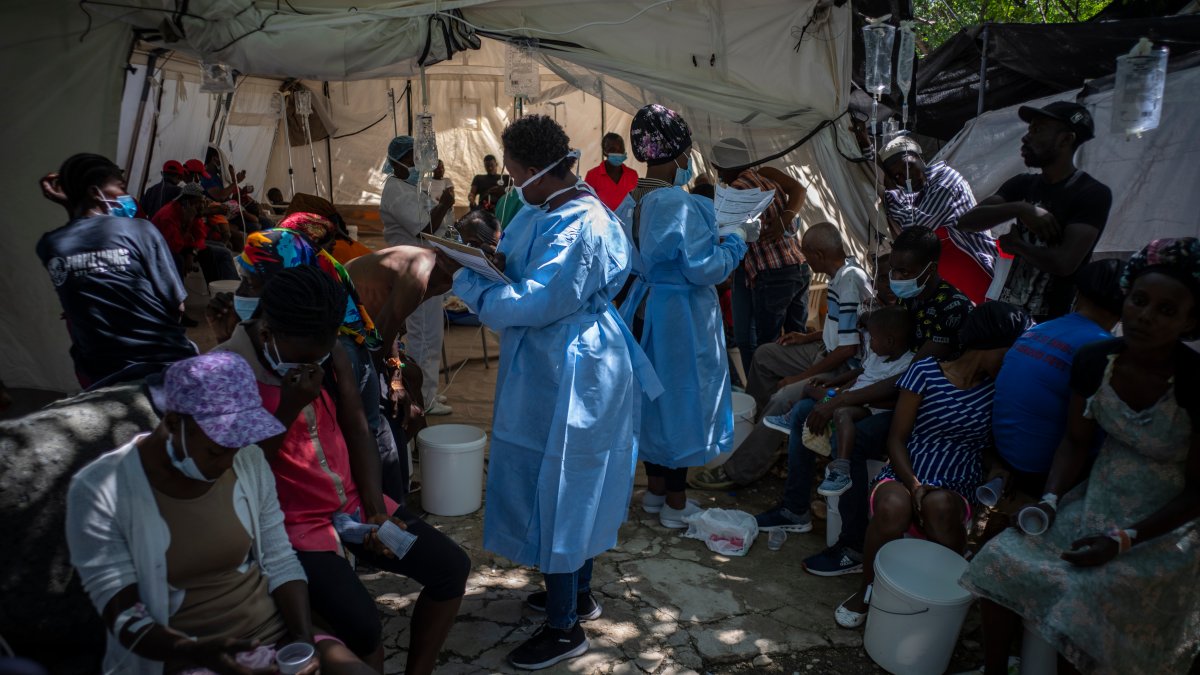The sun shone on Stanley Joliwa as medical staff at the open-air clinic circled him, pumping air into his lungs and pressing on his chest until he died.
Her mother was watching nearby.
“Only God knows my pain,” Willien Enfant said.
Less than an hour later, her 22-year-old son’s body lay on the floor, wrapped in a white plastic bag with the date of his death scrawled on it. He joined dozens of other Haitians who have died of cholera in a fast-spreading outbreak that is straining the resources of nonprofits and local hospitals in a country where fuel, water and other basic supplies are running low by the day.
Sweat broke out on the foreheads of staff at the Médecins Sans Frontières treatment center in the capital Port-au-Prince, where about 100 patients arrive each day and at least 20 have died. Families continued to rush this week with loved ones, sometimes dragging their limp bodies to an overcrowded outdoor clinic where the smell of waste filled the air.
Dozens of patients sat on white buckets or lay on stretchers as IVs made their way to bags of rehydration fluids that glistened in the sun. This month, Doctors Without Borders treated around 1,800 patients in its four centers in Port-au-Prince.
Transverse Haiti, many patients die because they say they can’t get to the hospital in time, health officials say. A surge in gang violence has made it unsafe for people to leave their communities, and fuel shortages have halted public transport, gas stations and other key businesses, including water companies.
Enfant sat next to her son’s body, recalling how Yoliwa had told her he had been feeling unwell earlier this week. She had already warned him and two other sons not to bathe or wash clothes in the sewage-polluted waters that flowed through a nearby ravine in their area – the only source of water for hundreds of people in the area.
Enfant insisted that her sons buy laundry water and add chlorine if they were going to drink it. As Joliwa became more and more difficult, Enfant tried to take care of him on her own.
“I said to him, ‘Honey, you need some tea,'” she recalled. “He said again, ‘I feel weak.’ He also said, “I can’t get up.”
Cholera is a bacterium that infects people who ingest contaminated food or water and can cause severe vomiting and diarrhea, which in some cases leads to death.
Haiti’s first major cholera outbreak occurred more than a decade ago, when UN peacekeepers introduced the bacteria into the country’s largest river through sewage drains at their base. Nearly 10,000 people died and thousands more fell ill.
Cases eventually dwindled to the point where World Health Organization Haiti is expected to be free of cholera this year.
But on October 2, Haitian officials announced that cholera had returned.
At least 40 deaths and 1,700 suspected cases have been reported, but officials believe the number is much higher, especially in the crowded and unsanitary slums and government shelters where thousands of Haitians live.
The situation is exacerbated by fuel and water shortages that began to ease last month when one of Haiti’s most powerful gangs surrounded a key fuel terminal and demanded the resignation of Prime Minister Ariel Henry. Gas stations and businesses, including water companies, have closed, forcing more and more people to rely on untreated water.
Shela Jun, a 21-year-old hot dog vendor whose 2-year-old son has cholera, said she buys small packets of water for her family but doesn’t know if she is being treated. She took him to the hospital where he remains on IV fluids.
“Everything I give him to eat, he just throws up,” she said.
On a recent morning, Zhen was among dozens of mothers seeking help for their children.
43-year-old Lauriol Chantal told a similar story. Her 15-year-old son started vomiting as soon as he finished eating, prompting her to rush him to a treatment center.
While at the center, her son Alexandre Francois told her he was hot.
“He said to me … ‘Mom, can’t you take me outside to wash me or pour water on my head?'” she said.
She obeyed, but suddenly he fell in her arms. Employees ran to help.
According to UNICEF, children under the age of 14 account for half of Haiti’s cholera cases, with officials warning that rising cases of severe malnutrition are also making children more vulnerable to the disease.
Haiti’s poverty also made matters worse.
“If you can’t get safe drinking water from the tap in your own home, if you don’t have soap or water purification tablets, and if you don’t have access to health services, you may not survive cholera or other water-borne diseases.” said Bruno. Mace, UNICEF Haiti representative.
Perpeti Joost, a 62-year-old grandmother, said one of her three grandchildren fell ill this week as she worried their condition could have led to her illness.
“We went a lot of days without food, I can’t lie,” she said. “No one works in my house.”
Joost, who lives with her husband, five children and three grandchildren, said she worked as a cleaner until her owners fled Haiti.
Rising demand for aid is putting pressure on Doctors Without Borders and others as they struggle to care for patients with limited fuel.
“It’s a nightmare for the population, and also for us,” said Jean-Marc Biquet, the organization’s project coordinator. “We still have two weeks of fuel left.”
Life is paralyzed for many Haitians, including Enfant as she mourns the death of her son. She wants to bury him in her hometown of Le Que on the south coast, but cannot afford the 55,000 gourdes ($430) it would cost to transport his body.
Enfant then fell silent and stared off into the distance as she continued to sit beside her son’s body – too stunned, she said, to get up.
https://www.nbcphiladelphia.com/news/national-international/cholera-crisis-hits-haiti-as-cases-and-deaths-rise/3406625/




